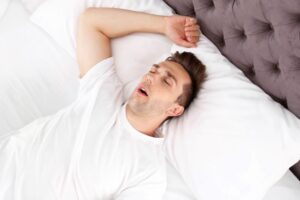
Do you sometimes wake up with a small damp spot on your pillow close to your mouth? If so, you were probably drooling while asleep. Occasional drooling may not be anything to be concerned about, but if it happens frequently, it could indicate that something else is going on. It could even be a sign of obstructive sleep apnea! What is the connection between drooling and sleep apnea? This blog post explains.
How Is Drooling Related to Sleep Apnea?
Drooling is simply the name for when you unintentionally allow saliva to flow out of your mouth. Obstructive sleep apnea (OSA), on the other hand, is a disorder that causes repeated disruptions in breathing during sleep.
At a glance, it might seem strange to draw a connection between these two issues. However, the link becomes clearer when you learn that people with OSA often breathe through their mouth during sleep. In other words, they keep their mouth open. This makes it easy for saliva to slip out.
Is Your Drooling a Sign of OSA?
Drooling can indicate nighttime mouth breathing, but it does not always mean that a person has OSA. If you drool and have additional OSA symptoms, such as the ones listed below, you should certainly see a professional to seek a diagnosis.
- Loud and frequent snoring.
- Daytime tiredness despite getting 7 to 8 hours of sleep.
- Morning headaches or sore throats.
- Difficulty concentrating.
- Waking up gasping for air.
- Frequent nighttime urination.
How to Stop Drooling and Breathe Better
If you find out that you have OSA, you can start to learn about your treatment options. Some people use a CPAP machine or a custom oral appliance, both of which are effective. However, you might be a candidate for an even easier option. It may be possible to use a laser to tighten the tissues in your upper airway. This can lead to improved breathing, which can eliminate or greatly reduce OSA symptoms. You may also be more likely to breathe through your nose at night and find freedom from drooling.
Of course, if you do not have OSA, you may need to find other ways to address your drooling. Some people find that drinking more water thins out their saliva so it is less likely to pool. Others get BOTOX injections to temporarily reduce saliva production.
Drooling may be a minor problem on its own, but if it points to sleep apnea, it could mean that your health is in trouble! Pay attention to the quality of your sleep so you can seek treatment when needed.
Meet the Practice
At Bio Dental, Drs. Candida Castillo and Keisi Ikonomi are proud to provide holistic dental services to the North Providence community. Our practice offers a range of treatments, including laser-based therapy for sleep apnea. If you have been diagnosed with OSA or are simply concerned about the quality of your nightly rest, our team can advise you on your next steps. Contact our office at 401-232-7777.
